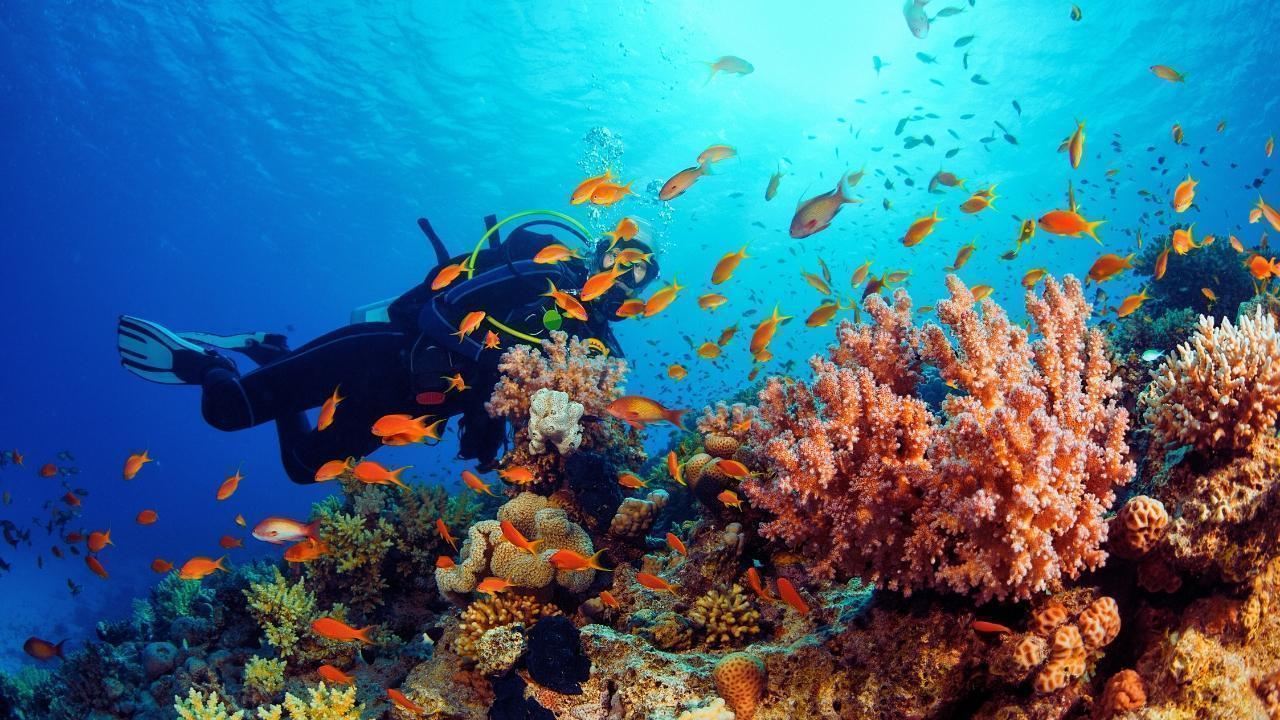
Post by : Anees Nasser
In recent years, the world of travel and adventure has taken a fascinating turn, moving beyond traditional landscapes and iconic cityscapes to explore realms that were once considered unreachable. Among the most exciting trends shaping the tourism industry today is underwater tourism. This unique travel experience is transforming how we perceive the ocean—not just as a body of water but as a vibrant, living world filled with breathtaking beauty, mystery, and adventure.
The allure of the underwater world has always captured human imagination. From mesmerizing coral reefs to historic shipwrecks resting silently on ocean floors, the depths of our oceans hold secrets that are both thrilling and awe-inspiring. What was once limited to professional divers or marine researchers is now becoming accessible to travelers worldwide, thanks to advancements in technology, innovative infrastructure, and growing consumer demand for experiential travel.
Underwater tourism today is more than just snorkeling or scuba diving. It now encompasses a wide range of activities—from luxury underwater hotels and submarine tours to glass-bottom boats and immersive aquariums designed to replicate marine ecosystems. These experiences offer travelers an opportunity to witness marine biodiversity up close while promoting sustainable interaction with fragile underwater environments.
The global travel industry has witnessed a significant shift toward personalized and experiential journeys. Modern travelers seek unique stories and unforgettable moments rather than conventional sightseeing tours. Underwater tourism fulfills this aspiration by delivering a rare blend of adventure, tranquility, and education. Imagine dining in a restaurant surrounded by panoramic views of colorful fish and coral reefs or sleeping in a luxurious suite submerged beneath the ocean surface. These one-of-a-kind experiences have become symbols of ultimate luxury and exclusivity, attracting travelers from around the globe.
Another factor contributing to this trend is social media. Stunning visuals from underwater restaurants in the Maldives or futuristic submarine rides shared on Instagram and TikTok have sparked curiosity among millions. This digital exposure has propelled destinations offering underwater experiences into global limelight, making them highly sought-after for honeymooners, adventure enthusiasts, and even corporate retreats.
Several destinations have emerged as leaders in underwater tourism, each offering something extraordinary for visitors:
The Maldives stands as a pioneer in underwater hospitality. Resorts here feature submerged dining spaces, transparent tunnel suites, and private tours into crystal-clear lagoons teeming with marine life. The combination of opulence and natural beauty makes the Maldives a top choice for underwater travelers.
Dubai is never short on ambitious projects, and underwater tourism is no exception. From underwater hotel suites to innovative aquarium dining experiences, the city blends futuristic architecture with marine exploration. These ventures showcase how engineering can create magical underwater worlds without disturbing ecosystems.
For those seeking a closer connection with nature, the Great Barrier Reef in Australia offers unparalleled diving and snorkeling opportunities. Home to thousands of species, this UNESCO World Heritage Site remains a favorite among eco-tourists and adventure seekers.
Norway offers a contrasting underwater experience with its icy waters and unique marine life. Submarine tours in fjords allow travelers to witness a side of the Arctic that few ever see, blending adventure with the serenity of nature.
Advancements in technology have played a crucial role in making underwater tourism accessible and safe. High-pressure-resistant materials, state-of-the-art filtration systems, and eco-friendly construction methods have enabled the development of underwater hotels and dining spaces without harming marine ecosystems.
Additionally, personal submarines and semi-submersible vessels are now being designed for tourist use, making it possible for even non-swimmers to explore the deep sea. Virtual reality (VR) has also entered the arena, offering simulated underwater experiences for those unable to physically dive into the ocean. These innovations not only enhance accessibility but also ensure that underwater experiences remain immersive and unforgettable.
While underwater tourism opens doors to spectacular experiences, it also brings responsibility. The delicate balance of marine ecosystems can easily be disrupted by human activities if not managed carefully. Fortunately, many destinations and service providers are prioritizing eco-friendly practices. From using non-toxic materials in construction to enforcing strict waste management protocols, the industry is working to minimize its ecological footprint.
Several organizations are also integrating educational components into their underwater tours, raising awareness about marine conservation. By fostering appreciation for ocean biodiversity, these experiences inspire travelers to become advocates for sustainable tourism and ocean preservation.
Despite its appeal, underwater tourism faces certain challenges. The cost of developing underwater infrastructure is extremely high, making it a luxury product affordable only to a niche audience. Maintenance, safety protocols, and environmental compliance further add to operational expenses.
Additionally, climate change poses a significant threat to marine ecosystems. Coral bleaching, rising sea temperatures, and ocean pollution could diminish the very beauty that draws tourists underwater. Addressing these challenges requires collaboration between governments, private sectors, and environmental organizations to ensure the long-term viability of underwater tourism.
Looking ahead, underwater tourism is poised to become one of the most dynamic sectors in global travel. As technology continues to evolve and consumer demand for unique experiences rises, we can expect to see more innovative concepts such as underwater museums, marine life research tours for travelers, and even fully submerged luxury resorts.
Moreover, as sustainability takes center stage, destinations will increasingly adopt green technologies and renewable energy solutions to power their underwater facilities. This will not only help protect marine life but also attract environmentally conscious travelers who prioritize responsible tourism.
While underwater tourism offers unparalleled experiences, it’s essential to consider factors like cost, accessibility, and personal comfort. For those with hydrophobia or medical conditions, traditional scuba diving or deep-sea tours may not be suitable. However, innovations such as glass-bottom boats and VR-based attractions are making it possible for almost everyone to experience the magic of the ocean, regardless of physical limitations.
Underwater tourism represents the perfect blend of adventure, luxury, and sustainability. It provides travelers with an opportunity to explore the least-charted territories of our planet while fostering a deeper appreciation for marine ecosystems. As this trend continues to evolve, it promises not just breathtaking views but also a powerful reminder of the ocean’s significance in maintaining Earth’s ecological balance.
From high-tech underwater hotels to immersive submarine tours, the possibilities are endless—and so is the potential for unforgettable memories. For travelers seeking something extraordinary, the future of tourism truly lies beneath the surface.
The information presented in this article is intended for general awareness and educational purposes. Travel plans should be made after verifying all safety, legal, and environmental regulations associated with underwater tourism.










Curry Powers Warriors to Nail-Biting 109-108 Victory Against Spurs
Stephen Curry's 49 points propel the Warriors to a dramatic 109-108 NBA Cup triumph over the Spurs,

India Advances to Semi-Finals After Thrashing USA in Women’s Blind T20 World Cup
India secured a dominant ten-wicket victory over the USA, advancing to the semi-finals in the Women’

South Africa's Early Advantage as India Struggles on Day Two
On Day Two, India reached 138-4 as South Africa took three early wickets, complicating matters with

Kenta Nishimoto Defeats Lakshya Sen in Japan Masters Semifinal
Lakshya Sen's journey in the Japan Masters ends after losing to Kenta Nishimoto 19-21, 21-14, 12-21

Kenta Nishimoto Defeats Lakshya Sen in Japan Masters Semifinals
Lakshya Sen's run at the Japan Masters concludes with a loss to Kenta Nishimoto in the semifinals, 1

Major IPL Trade: Jadeja Joins Royals as CSK Signs Samson
In a significant IPL trade, CSK has acquired Sanju Samson from Rajasthan Royals in exchange for Ravi